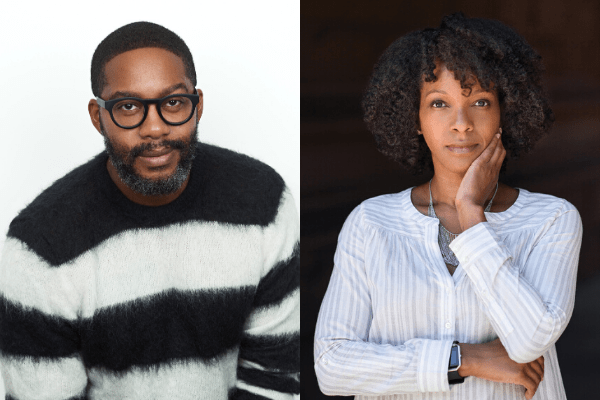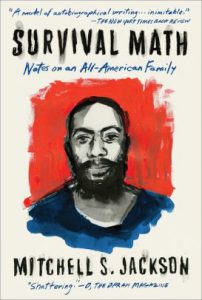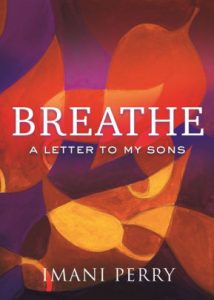PEN Out Loud Talks: Mitchell S. Jackson and Imani Perry
In advance of their PEN Out Loud event on February 12 at the Strand Bookstore, Mitchell S. Jackson (Survival Math: Notes on an All-American Family) and Imani Perry (Breathe: A Letter to My Sons) spoke with us about their writing process, the importance of freedom of expression, and books we should be reading.

Mitchell S. Jackson
 1. Why do you think it is valuable for writers to be in conversation with each other about their work and current events through series like PEN Out Loud?
1. Why do you think it is valuable for writers to be in conversation with each other about their work and current events through series like PEN Out Loud?
I think it’s valuable because ideas need other ideas to sharpen. I think the exchanges help us grow as writers and thinkers. I look forward to panels and conversations in general because I crave new perspectives, other angles of vision, opposition. I learn how to better read other writers by interacting with them. I’ve always been impressed by the caliber of writers that have been a part of this particular series. I liken it to sports as in the match ups are prime and that great players tend to bring out the best in each other.
2. What does PEN America’s work defending freedom of expression mean to you?
PEN’s work is essential, especially now when free speech and the integrity of journalism is under attack by this administration. We are living in the age of disinformation, fake news, flat out lies, physical threats and violence against journalists, assaults on long venerated institutions. And of course, it’s not just America but abroad. PEN is out here fighting the good fight against these troubling exigencies.
3. What does a typical writing session look like for you?
I wish I had a typical writing session. I should have one. When I’m cooking, which is must less often than should be the case, I keep a writing pad near my bedside and wake up throughout the night and write notes. I also feel most productive in the morning. I know I’m in the right space when the work is dominating my thoughts when I’m away from my desk. I also do marathon writing days where I’ll write for 10 or 12 hours a day or more. That’s usually when I’m pushing up on a deadline. I also jot notes whenever they come to me, a lot of the times on trains.
“We are living in the age of disinformation, fake news, flat out lies, physical threats and violence against journalists, assaults on long venerated institutions. And of course, it’s not just America but abroad.”
4. What behind-the-scenes snippet in your life would probably surprise your readers the most?
I’ve been trying to get a six pack and my bodybuilder friend is working as my nutritionist. Part of my plan includes drinking a gallon of water a day, so I’ve been carrying around a half-gallon S’well bottle for weeks.
5. What are five books you suggest for recommended reading?
I’d suggest reading two poetry books that are out this spring. The first is Kontemporary Amerikan Poetry by John Murillo, which publishes March 2. The second is Postcolonial Love Poem by Natalie Diaz, which publishes March 3. I’d also recommend Maaza Mengiste’s new novel The Shadow King and Kimberly King Parson’s short story collection Black Light. My fifth recommendation is Gregory Pardlo’s recent memoir Air Traffic. All of the books I recommended are by people who respect the line, who know how to turn a phrase, either a great poet and/or a stylist.
Imani Perry
 1. Why do you think it is valuable for writers to be in conversation with each other about their work and current events through series like PEN Out Loud?
1. Why do you think it is valuable for writers to be in conversation with each other about their work and current events through series like PEN Out Loud?
Writers find themselves responding to the zeitgeist of the moment, even when telling stories of the past. But of course, the various circumstances of our lives lead us towards varying ways of interpreting things. So it’s wonderful to talk with each other, a shared moment but with distinct lenses and emotions.
2. What does PEN America’s work defending freedom of expression mean to you?
One of the things that is insufficiently recognized is how often freedom of expression has been denied to members of oppressed groups in the United States. As a Black woman, born in the deep south, I am particularly attuned to how important it is to bring my tradition of resistance, resilience, and lifting every voice everywhere I go.
3. What does a typical writing session look like for you?
There’s nothing really typical because I’m a parent. So I write whenever I can fit it in, sometimes in parking lots, sometimes during bouts of insomnia, but most ideally when I wake up early and everything is quiet and I have a few hours to myself.
“As a Black woman, born in the deep south, I am particularly attuned to how important it is to bring my tradition of resistance, resilience and lifting every voice, everywhere I go.”
4. What behind-the-scenes snippet in your life would probably surprise your readers the most?
I spend a lot of time jumping on a mini-trampoline in my bedroom.
5. What are five books you suggest for recommended reading?
This question is always so hard for me because I love so many books, and there are so many new wonderful ones coming out all the time. But I have been thinking that it’s a great time to read Toni Morrison’s Paradise, Arundhati Roy’s The Ministry of Utmost Happiness, Virginia Woolf’s Orlando, Gabriel Garcia Marquez’s 100 Years of Solitude, Shakespeare’s The Tempest together. There’s just so much about exclusion, inclusion, difference, power and gender in these texts that complement each other.






